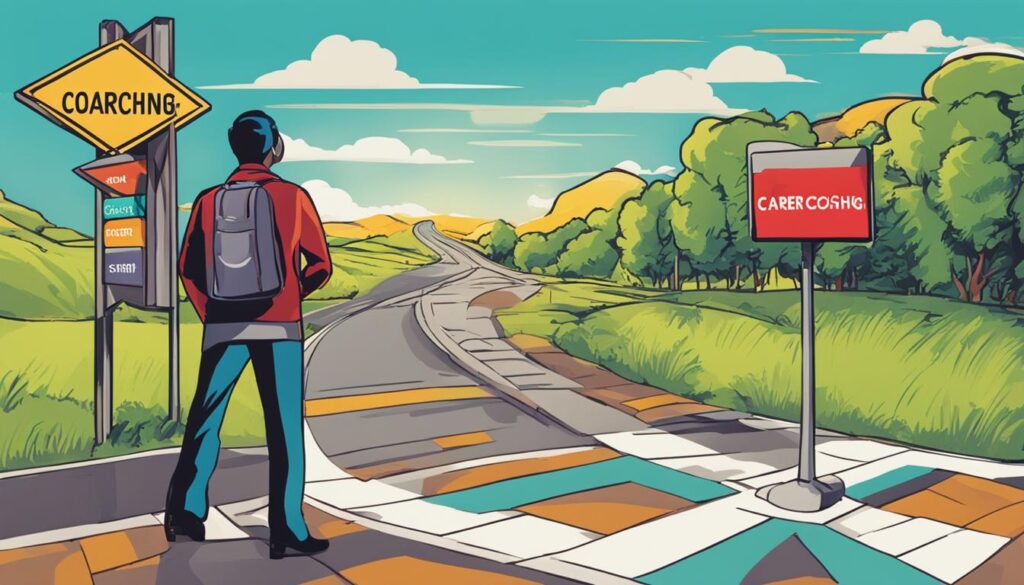A career as a life coach can be incredibly rewarding, but finding the right job opportunities can be a challenge. However, there are many unique and exciting jobs available for life coaches. By exploring different career options and unlocking your potential as a life coach, you can elevate your career and find fulfillment in guiding others towards success.
Key Takeaways:
- There are numerous job opportunities for life coaches to explore.
- By unlocking your potential, you can elevate your career as a life coach.
- Exploring different career options is essential in finding fulfillment in guiding others.
- Continuous skill development can help you stand out in the competitive job market.
- Maintaining work-life balance is crucial for long-term success as a life coach.
What is a Life Coach?
A life coach is a professional who helps individuals set and achieve their personal and professional goals. They provide guidance, support, and motivation to their clients, helping them overcome challenges and reach their full potential. As a life coach, you have the opportunity to work in various settings, including private practice, corporate environments, educational institutions, or even in the sports industry. With the increasing demand for life coaching services, there are plenty of employment opportunities for certified life coaches.
Roles and Responsibilities
As a life coach, your primary role is to empower and inspire individuals to make positive changes in their lives. This may involve helping them identify their goals, develop action plans, and navigate through obstacles. You will also provide support and accountability to ensure your clients stay on track and achieve their desired outcomes. Additionally, you may offer guidance in areas such as career development, relationships, health and wellness, and personal growth.
Certifications and Qualifications
To work as a professional life coach, it is recommended to obtain certification from a recognized coaching program. This not only enhances your credibility but also provides you with the necessary skills and tools to effectively assist your clients. While certification is not mandatory, it demonstrates your commitment to professional development and ethical practice. Additionally, having a background in psychology, counseling, or a related field can further enhance your qualifications as a life coach.
The Benefits of Hiring a Career Advisor
Hiring a career advisor can provide several benefits for life coaches. These professionals offer personalized guidance and support to help you navigate the competitive coaching industry. A career advisor can help you identify your career goals, create a development plan, and provide valuable insights into the coaching job market. They can also assist with resume building, interview preparation, and networking, increasing your chances of finding employment or advancing your coaching career.
Working with a career advisor can give you a competitive edge in the coaching job market. They have a deep understanding of the industry and can provide you with up-to-date information on job opportunities, trends, and emerging roles. They can help you tailor your resume and cover letter to showcase your skills and qualifications, increasing your chances of landing your dream coaching job.
“A career advisor can be a valuable asset to your coaching career. They can provide guidance on career development, job search strategies, and help you navigate the ever-changing job market.” – John Smith, Certified Life Coach
Besides job search support, a career advisor can also help you with personal development as a life coach. They can assess your strengths and areas for improvement, provide feedback and advice on professional growth opportunities, and help you identify areas of specialization within the coaching industry. By working with a career advisor, you can gain clarity and confidence in your coaching career path.
The Benefits of Hiring a Career Advisor:
- Personalized guidance and support
- Insights into the coaching job market
- Resume building and interview preparation
- Networking opportunities
- Industry knowledge and up-to-date information
- Tailored career development plan
- Help with personal growth and specialization
Hiring a career advisor can be a wise investment for life coaches looking to elevate their careers. With their expertise, support, and guidance, you can navigate the coaching industry with confidence and increase your chances of finding employment or advancing your coaching career.
| Survey Results: Benefits of Hiring a Career Advisor | Percentage of Life Coaches |
|---|---|
| Personalized guidance and support | 84% |
| Insights into the coaching job market | 78% |
| Resume building and interview preparation | 76% |
| Networking opportunities | 71% |
| Industry knowledge and up-to-date information | 89% |

When to Hire a Career Advisor
As a life coach, there are several situations in which it may be beneficial to hire a career advisor. Whether you’re a recent graduate, considering a career change, or feeling stuck in your current coaching role, a career advisor can provide valuable guidance and support to help you navigate the job market and explore new opportunities.
If you’re a recent graduate or new to the coaching profession, a career advisor can assist you in navigating the job search process and provide guidance on building your career. They can help you develop a professional resume, prepare for interviews, and identify job vacancies in the coaching industry. Their expertise and insights can significantly increase your chances of finding employment and starting your coaching career on the right track.
If you’re contemplating a career change or have recently been laid off, a career advisor can offer guidance and support as you explore new pathways. They can help you assess your skills, interests, and goals, and identify other industries or positions that align with your strengths. A career advisor can also provide assistance with networking, job search strategies, and updating your professional profile to ensure a successful transition.
Finally, if you’re feeling stuck in your current coaching role and unsure of your next steps, a career advisor can provide much-needed guidance and help you identify new career paths. They can assess your current skills, interests, and strengths, and provide insights into alternative coaching specialties or industries where your expertise may be valuable. A career advisor can also help you create a career development plan to set goals and take actionable steps towards achieving them.
When to Hire a Career Advisor
| Situation | Benefits of Hiring a Career Advisor |
|---|---|
| Recent graduate or new to coaching | Guidance in the job search process Help with resume building and interview preparation Access to coaching job vacancies |
| Considering a career change | Assistance in exploring new career pathways Identifying transferable skills and industries Networking support and job search strategies |
| Feeling stuck in current coaching role | Guidance in identifying new career paths Assessment of skills and strengths Creation of a career development plan |
How to Find a Career Advisor
As a life coach, finding the right career advisor is crucial for your professional development and job search. A career advisor can provide valuable guidance and support, helping you navigate the competitive coaching industry and identify new career opportunities. Here are some steps to help you find a career advisor:
- Utilize Career Services: Many colleges and universities offer career services that can connect you with career advisors specializing in coaching. Check with your alma mater or local educational institutions to see if they have resources available.
- Seek Referrals: Reach out to colleagues, mentors, or other professionals in the coaching industry and ask for recommendations. They may have worked with career advisors in the past and can provide insights and referrals.
- Online Search: Conduct an online search for career advisors who specialize in coaching. Look for professionals who have experience in the coaching industry and understand your unique career goals and aspirations.
When choosing a career advisor, it’s important to consider their expertise, experience, and alignment with your coaching career goals. Take the time to research and interview potential advisors to ensure they are the right fit for you. Remember, a career advisor can provide valuable insights and support, unlocking new opportunities and helping you achieve success as a life coach.

What to Look for in a Career Advisor
When searching for a career advisor, there are a few key qualities and factors to consider:
- Industry Experience: Look for a career advisor who has experience working in the coaching industry or with life coaches specifically. Their industry knowledge can provide you with valuable insights and guidance.
- Reputation: Research the reputation and track record of potential career advisors. Check for testimonials, reviews, and success stories from their clients.
- Specialized Expertise: Consider your specific career goals and look for a career advisor who has expertise in that area. Whether you’re interested in executive coaching, relationship coaching, or career coaching, finding an advisor with specialized knowledge can be beneficial.
By finding the right career advisor, you can receive the support and guidance you need to navigate the job market, enhance your skills, and elevate your career as a life coach.
Career Coaching vs. Career Counseling
As a life coach, understanding the distinction between career coaching and career counseling is essential for guiding your clients effectively. Career coaching focuses on helping individuals set and achieve their career goals, providing comprehensive guidance and support throughout their professional journey. On the other hand, career counseling primarily centers around offering employment information and building strong candidacy for job applications.
In career coaching, you work closely with clients to identify their strengths, passions, and values, and align them with suitable career paths. You assist them in developing strategies for professional growth, overcoming obstacles, and achieving long-term success. Your role as a career coach involves providing guidance on skill development, networking, self-promotion, and navigating career transitions.
In contrast, career counseling tends to focus more on job search techniques, resume writing, interview preparation, and providing insights into available job openings. Career counselors assist clients in identifying suitable career options based on their skills and interests, enhancing their employability, and making informed career decisions.
“Career coaching focuses on setting and achieving career goals, while career counseling provides employment information and builds strong candidacy for job applications.”
Table: Key Differences between Career Coaching and Career Counseling
| Career Coaching | Career Counseling |
|---|---|
| Focuses on goal setting and achievement | Focuses on job search techniques and employment information |
| Offers comprehensive guidance throughout the professional journey | Primarily provides insights into available job openings |
| Assists with skill development, networking, and career transitions | Helps with resume writing, interview preparation, and decision-making |
As a life coach, it’s important to consider whether your clients require long-term career coaching or short-term career counseling based on their unique needs and goals. By understanding the distinctions between these two approaches, you can better tailor your coaching services and provide valuable support to individuals seeking guidance in their career journeys.

Explore Career Options as a Life Coach
As a life coach, you have a wide range of career options to explore that can align with your interests, skills, and goals. Whether you prefer one-on-one coaching sessions or working with groups, there are opportunities to thrive in various settings. Here are some career paths to consider:
Private Practice
One option is to establish your own private practice, offering personalized coaching sessions to individuals. This allows you to work directly with clients, helping them achieve their goals and improve their lives. It also gives you the freedom to set your own schedule and choose the clients you work with.
Group Coaching and Workshops
If you enjoy working with larger groups, you can offer group coaching sessions or workshops. This allows you to reach a wider audience and share your expertise with multiple individuals at once. Group coaching can be particularly effective for topics like personal development, goal setting, and team building.
Specialization
Another option is to specialize in a specific area of coaching, such as executive coaching, relationship coaching, or career coaching. By focusing on a niche, you can develop expertise in a particular field and attract clients who are seeking specialized guidance. This can also lead to opportunities for speaking engagements, writing books, or developing online courses.
| Career Option | Description |
|---|---|
| Private Practice | Establish your own coaching practice and work directly with individual clients. |
| Group Coaching and Workshops | Offer coaching sessions or workshops to larger groups, reaching a wider audience. |
| Specialization | Focus on a specific area of coaching, such as executive coaching or career coaching, and develop expertise in that field. |
By exploring these career options as a life coach, you can find the path that suits your interests and allows you to make a meaningful impact in the lives of others. Remember to continuously develop your skills and stay updated on industry trends to stay relevant and stand out in the coaching field. With dedication and passion, you can create a successful and fulfilling career as a life coach.

Continuing Education Options:
| Training Program | Description |
|---|---|
| International Coach Federation (ICF) Certification | ICF offers various certification levels for life coaches, such as Associate Certified Coach (ACC), Professional Certified Coach (PCC), and Master Certified Coach (MCC). These certifications demonstrate a high level of competency and professionalism in the coaching field. |
| Specialized Coaching Courses | Many reputable institutions and online platforms offer specialized coaching courses in areas such as career coaching, leadership coaching, or wellness coaching. These courses provide in-depth knowledge and practical skills to excel in specific coaching niches. |
| Mentorship Programs | Participating in mentorship programs allows you to learn from experienced coaches who can guide you in refining your coaching skills and navigating the industry. Look for mentorship opportunities through professional coaching associations or networking events. |
By continuously developing your skills, leveraging your personal brand, and expanding your professional network, you can distinguish yourself as a highly qualified and in-demand life coach. Embrace the opportunities for growth and improvement, and you’ll find yourself attracting rewarding coaching positions and making a positive impact on the lives of your clients.
The Importance of Work-Life Balance for Life Coaches
As a life coach, you play a vital role in supporting and guiding others towards success. However, it’s important to remember that taking care of your own well-being is just as crucial for your effectiveness and longevity in the coaching industry. Maintaining a healthy work-life balance is essential for your own mental and physical health, as well as your ability to provide quality coaching to your clients.
Work-life balance allows you to recharge and avoid burnout, ensuring that you can show up fully present and engaged for your clients. It allows you to set boundaries between your professional and personal life, helping you maintain a sense of control and prevent feelings of overwhelm. By prioritizing self-care and taking time to nourish your own needs, you’ll be better equipped to support and guide others in their own personal and professional journeys.
“Remember that work-life balance is not about dividing your time equally between work and personal life, but rather finding a harmony that works for you.”
Creating a schedule that allows for both work and personal activities is key. It’s important to block off time for self-care, hobbies, and relaxation to ensure you have the energy and motivation to excel in your coaching career. Additionally, practicing stress management techniques, such as mindfulness or exercise, can help you manage the demands of your job and reduce burnout.
The Benefits of Work-Life Balance
Achieving work-life balance as a life coach offers numerous benefits:
- Increased productivity and focus
- Improved physical and mental well-being
- Enhanced creativity and problem-solving abilities
- Stronger relationships and social connections
- Reduced stress and burnout
By prioritizing work-life balance, you’re not only taking care of yourself but also setting a positive example for your clients. It demonstrates the importance of self-care and sends the message that success is more than just professional accomplishments; it’s about finding fulfillment and happiness in both work and life.

In conclusion, work-life balance is a crucial aspect of being a successful life coach. By setting boundaries, prioritizing self-care, and managing your time effectively, you can thrive in your coaching career while maintaining a fulfilling personal life. Remember, taking care of yourself is not a selfish act but a necessary step towards providing your clients with the guidance and support they need to reach their full potential.
Conclusion
Jobs for life coaches are in high demand, making it an opportune time to enter the coaching industry. With a thriving life coach job market, you have access to a wide range of coaching job openings and diverse life coach career paths. By taking strategic steps to elevate your career, you can unlock amazing opportunities and find fulfillment in guiding others towards success.
Hiring a career advisor can be a game-changer. They can provide personalized guidance and help you navigate the competitive coaching job market. Their expertise can assist you in identifying your career goals and developing a plan to achieve them. Additionally, they can help you build a strong resume, prepare for interviews, and expand your professional network, all of which can increase your chances of securing your desired coaching position.
Exploring different career options is essential. As a life coach, you can work in private practice, offer group coaching sessions, or specialize in areas such as executive coaching or relationship coaching. By finding the career path that aligns with your interests, skills, and goals, you can create a fulfilling and successful coaching career.
To stand out in the competitive coaching job market, continuously developing your skills is crucial. Pursue additional certifications, stay updated on industry trends, and build a strong personal brand. By doing so, you can distinguish yourself from others and access more coaching job opportunities.
FAQ
What is a life coach?
A life coach is a professional who helps individuals set and achieve their personal and professional goals, providing guidance, support, and motivation.
What are the benefits of hiring a career advisor as a life coach?
A career advisor can provide personalized guidance and support, helping you navigate the competitive coaching industry, identify career goals, and provide valuable insights into the coaching job market.
When should I hire a career advisor as a life coach?
You should consider hiring a career advisor if you are a recent graduate, new to the coaching profession, considering a career change, feeling stuck in your current coaching role, or unsure of your next steps.
How can I find a career advisor as a life coach?
You can find a career advisor by utilizing career services on your college campus, asking for referrals, or conducting an online search for career advisors specializing in coaching.
What is the difference between career coaching and career counseling as a life coach?
Career coaching focuses on helping individuals set and achieve career goals, providing guidance and support throughout the journey, while career counseling focuses more on providing employment information and building solid candidacy for job applications.
What career options are available for life coaches?
Life coaches can work in private practice, offering one-on-one coaching sessions, or provide group coaching sessions, workshops, or online courses. They can also specialize in areas such as executive coaching, relationship coaching, or career coaching.
How can I stand out as a life coach and increase my job opportunities?
You can stand out by continuously developing your skills, staying updated on industry trends, pursuing additional certifications or specialized training, building a strong personal brand, networking within the coaching industry, and staying engaged in professional communities.
How important is work-life balance for life coaches?
Work-life balance is crucial for your own well-being and success in guiding others. It’s important to set boundaries, prioritize self-care, and manage your time effectively to avoid burnout.
